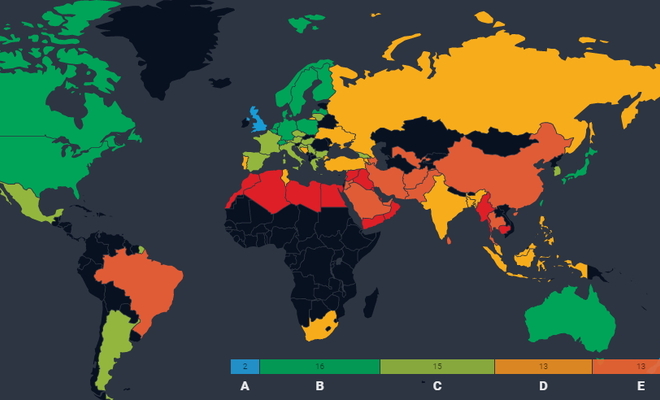The Government Defence Anti-Corruption Index: Croatia in moderate risk category for corruption

Croatia’s GI ranking in Band C places it in the moderate risk category for corruption in the defence and security sector. The highest risk area is Operations, which fell in Band E (very high risk of corruption).
DEFENCE PROCUREMENT
There is a significant level of opacity regarding defence procurement and tendering, although this has been gradually improving. Some elements of the defence procurement cycle are disclosed in detail; other elements, though openly disclosed, are only summarized or are otherwise less clear. A limited amount of procurement information is published online and the criteria to determine whether information is published are not clear. The MoD has been publishing information on plans for procurement and details of previous procurements for the last few years. It must disclose all aspects in full, and ensure that mechanisms provide continuous independent control over the public procurement procedures for defence. It must also review its processes to ensure that procurements remain unclassified by default unless there is specific justifiable need to do so.
Internal rules on procurement have also not been published publicly, although the MoD has reportedly adopted some. It should publish these for independent verification, and make its records of steps taken in the preparation and implementation of public procurements publicly available.
There are no regulations regarding the selection and activity of tender board commissions, and it is unclear how the members of the public procurement unit inside the MoD are selected. These should be made publicly available. There are examples when the government has established an inter-sector committee comprised of high ranking state officials for larger procurement contracts – at least one of these (the Patria vehicle procurement) has resulted in a major international scandal without any official indictment.
Very little information is available on spending across the security and intelligence sector. Research found that the only data that has been made publicly available is a total budget for each institution. Furthermore, the Military Security Intelligence Agency budget has also been spread across different items in the MoD budget and cannot be estimated. It is possible that the intelligence agencies are able to conduct off–budget expenditure.
The government must establish formal contractual requirements for contractors and subcontractors to implement compliance programmes. There is currently no evidence of any formal requirement to do so, nor that anticorruption clauses be included in contracts.
OFFSET PROGRAMMES
Croatia is engaging in offset programs, however there are no regulations requiring transparency and they remain almost entirely secret. Offsets are currently regulated by an 'Instruction' which carried less legal weight than an act and gives power to the Minister of Defence and Minister of Economy to directly negotiate conditions with the contractor. This is a significant risk that must be addressed. As a full member of the EU, Croatia should also adopt the Code of Conduct for the conclusion of offset programs developed by the European Defence Agency.
Croatia does not regulate the role of possible agents and intermediaries in the public procurement procedure. Their eventual role must not go out of boundaries of the existing legal framework regulating public procurement (and also the Penal Code) but there is no specific regulation of this area.
Detailed information on financial packages surrounding contracts is not available. The MoD is only obliged to publish the total agreed amount and implementation period for unclassified contracts, within 48 days of signing the contract.
The media has criticised the MOD for avoiding reporting obligations by dispersing procurement contracts via several smaller contracts (or via a consortium). This practice should be halted and a clear, practical policy implemented to prevent it from occurring in future.
APPOINTMENTS AND PROMOTIONS
The appointment process for senior intelligence officials is unclear. Intelligence agencies do not publish advertisements prior to hiring, and information on recruitment for senior intelligence service posts is not available on the service’s website. There are no clear criteria published for senior positions.
It is unclear if candidates are appropriately investigated to establish suitability. Media reports in 2014 indicated that intelligence officers had been employed without security clearances. Official investigations by the Parliamentary Committee on National Security have found strong irregularities in employment procedures. Although the Intelligence Agency has reported that new rules on employment procedures have been introduced, these rules are classified.
WHISTLE-BLOWER PROTECTION
There is no evidence of efforts to promote whistle-blowing of corruption cases in the defence and security sector. Some weak provisions on whistleblowing are integrated in the Penal Code. However, NGOs and media have reported on several cases when whistle blowers were punished after they have disclosed information on corruption. Proactive steps must be taken that protect and encourage whistleblowing.
Initiatives from some NGOs and opposition parties as well as from the president of Croatia for adopting an Act on whistle-blowers have not been welcomed by the government, which has stated that current legislation is good enough for whistle-blower protection.
Detailed report is available here.



